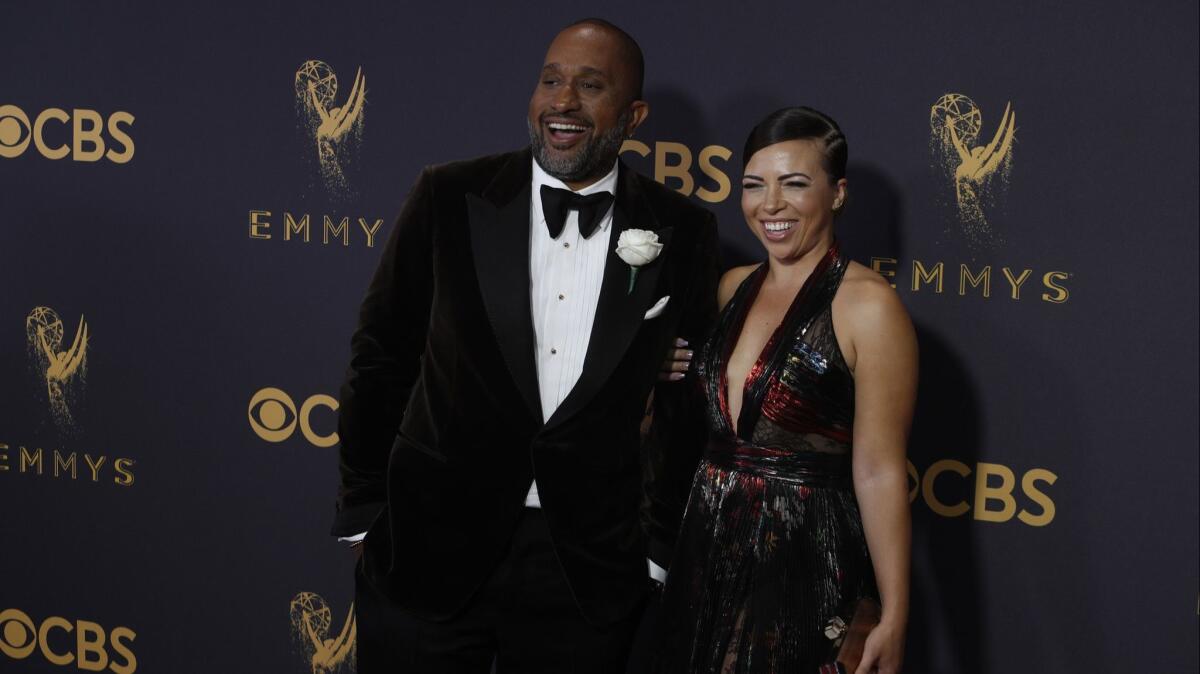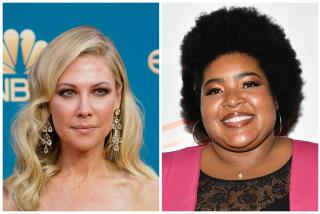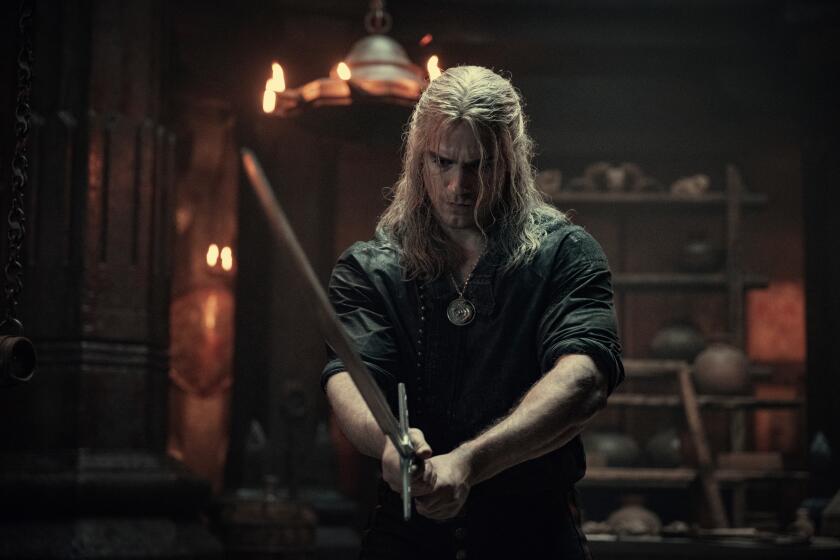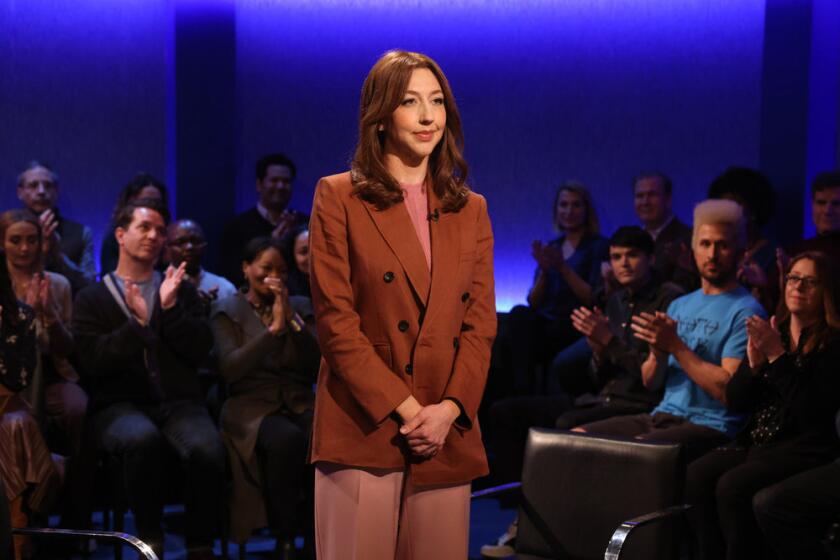‘black-ish’ showrunners on moving the series forward without creator Kenya Barris

When “black-ish” creator Kenya Barris was planning his exit from ABC this summer, he was also planning how to keep the sitcom — about a black family in a predominantly white, upper-class neighborhood — in good hands. The prolific TV producer left the network in August, three years before his contract was up, to write and produce exclusively for Netflix.
Premiering in 2014, “black-ish” made history as the first major broadcast network comedy in almost a decade to revolve around a black family. The sitcom was also Barris’ most personal project, one largely based on his own family and experiences, so it was vital to hand off the show to people he could entrust with his vision.
Barris first turned to Jonathan Groff, who was a co-showrunner with Barris for three seasons. Next, they immediately tapped Kenny Smith, an experienced writer-director who was a showrunner on BET’s “The Game” and was most recently co-executive producer on NBC’s “Marlon.” Smith also served as “black-ish’s” co-executive producer in Season 3.
Over email, Barris wrote about his decision for choosing Smith.
“Because he’s black. No other reason. It sounds like I’m joking… and I am. But only sort of,” Barris wrote. “It was really important to me to have someone who shared the experiences of this family also be a part of telling the stories about a black family.”
For Smith, becoming a “black-ish” showrunner presented an opportunity to join a history-making series that resonated with his family.
“I’ve been on almost a dozen comedy shows, but to also be on a show that says the things that this show says and has the kind of fun this show has, and honestly still be a black show… it feels really good,” Smith said.
“There’s certain stories you can’t tell on ‘Modern Family’ or on any other family show that can only be told by this black family, and that’s what I love and appreciate,” Smith noted later.

The issue-based sitcom about “Dre” Johnson (Anthony Anderson), an advertising executive who lives with his anesthesiologist wife, Bow (Tracee Ellis Ross), their five kids and his aging parents, began its fifth season last week. Last season took a dramatic turn with Dre and Bow’s brief separation. In this season, the Johnson family navigates new challenges, including their 18-year-old son Junior returning home for a gap year and twins Jack and Diane entering junior high.
Although Barris still reviews scripts for the show, Groff and Smith have taken the reins. Together with a diverse writing staff, they’re ready to continue Barris’ legacy and move the show forward. “We all know [Barris’] voice and the things he kind of clings to as an interesting story,” Groff said. “It’s been pretty smooth for us.”
On an early October day, Smith made his way to the set on the ABC-Disney studio lot from the “black-ish” offices, sporting a big grin when he stepped into the Johnson family kitchen. He was there to observe a scene from the season’s eighth episode where Bow persuades Dre to take Junior (Marcus Scribner) back to his job after being called a sellout.
Although Ross and Anderson were deep in rehearsal mode, closely reviewing lines by the kitchen island, they instantly lighted up when they saw Smith, exchanging high-fives and daps. “Down here on the floor, there’s no difference,” Ross said during a brief break from rehearsal, referring to Barris’ departure. “By Season 5, we’re in our flow, and I think [Barris] did such a good job of setting up what the tone of the show was.”
“Everybody’s firing on all cylinders,” said Anderson, who is also an executive producer on the show. “It’s a family affair here, and our ship is still being steered pretty straight.”
“There’s certain stories you can’t tell on ‘Modern Family’ or on any other family show that can only be told by this black family, and that’s what I love.”
— Kenny Smith, ‘black-ish’ co-showrunner
“Black-ish” is acclaimed for its willingness to humorously tackle salient issues ranging from police brutality to the N-word to the Black Lives Matter movement. And since the show’s first season, the writers room has been ground zero for workshopping “black-ish’s” most provocative topics.
The room, which is diverse in terms of gender, age and ethnicity, is ripe for impassioned discussions.
“Whenever a topic comes up and everybody gets fired up about it, that’s usually something we latch onto,” Smith said. “You take those opinions and spread them out amongst the characters so everyone has a voice and we’ll have a real debate on-screen as well.”
In Season 1, it happened when Barris asked writers their thoughts on spanking their kids. In Season 2, intense debates about gun ownership made it into the series. This season, the idea of “message movies” and the guilt support for some films became a hot topic.
“We wanted to transfer that into a big message movie; in this case, we’re doing an episode where there’s a big Rosa Parks movie out for the holidays,” Groff said. “And Dre’s like, ‘Of course, we’re going to see that, we’re going to represent.’ And for the kids, they want to go see a superhero movie.”
“As responsible black people, we have to go support. Then it spills into ‘Is this even a good movie?’” Smith said. “It’s the weight you have to carry when you’re a minority.”
There are, however, some issues that the show hasn’t been able to tackle. During the fourth season, the network shelved “Please, Baby, Please,” an episode written by Barris that touches on Dre’s concerns over different social issues, including athletes kneeling during the national anthem. Barris and the network were unable to come to an agreement over how the episode handled certain issues.
“I think we would’ve done it,” Groff said of the episode. “We absolutely would’ve done it differently if Kenny and I were doing it, because a lot of that was a very personal script and directed by Kenya in a personal way.”
Groff added that athletes kneeling could possibly find its way into future episodes.
“It’s a kind of thing that we would in terms of a topic or an area for sure talk about again, absolutely,” Groff said.

But much has changed since 2014, when audiences were merely concerned about the show’s name before its premiere. Now, as “black-ish” approaches its 100th episode this season, viewers often expect the series to be a platform for social injustices.
“That expectation is both great, because we do like to be able to say stuff, and sometimes it’s not a burden, but it’s complicated,” Groff said. “You have to make sure the story connects to us and to this family and we’re not just climbing on a platform to say something because it’s time for us to weigh in.”
Anderson and Ross also reflected on the significance of 100 episodes.
“When Kenya and I sat down six years ago and thought about what we wanted to do and the type of show we wanted to make and do every week and to have us stand here now, 100 plus episodes, still turning out these stories and still being relevant and still having our show resonate with an audience, it’s a pretty big deal for us, and me in particular,” Anderson said.
“To be on a show for that long, there’s something really heartwarming and humbling about it,” Ross said. “To get to 100, it’s a career blessing.”
But instead of exploring a heavy topic for the show’s 100th episode, Groff and Smith said it will be much more light-hearted — an “extravaganza” dedicated to the late artist Prince.
“It’s a romp,” Groff said. “It really leans on our cast, just the sort of magic that they have of what they can do as performers.”
Laughing, Smith clarified: “Black show magic.”
More to Read
The complete guide to home viewing
Get Screen Gab for everything about the TV shows and streaming movies everyone’s talking about.
You may occasionally receive promotional content from the Los Angeles Times.







